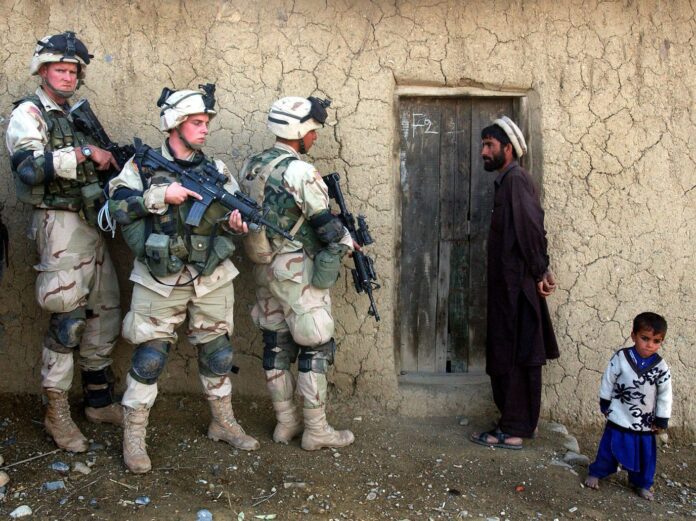The US invaded Afghanistan with arrogance but withdrew in disgrace. The strategic failure of the so-called “war on terror” has shattered the US war frenzy. None of the parties directly or indirectly involved, seem to be satisfied with the achievement of the so-called “war on terror” and the outcome of the Doha agreement, while the world has become even more, dangerous than it used to be two decades earlier.
Khalilzad is an Afghan-American diplomat who has long been involved in Washington’s Afghan policy and is known for his treacherous character in Afghanistan and as per Trump’s remarks in the US as well. At the first Bonn conference during the US invasion of Afghanistan, he played a significant role in handing over the power to the warlords that subsequently contributed to defamation of the system. He was a key figure in drafting the constitution and the formation of the presidential system in Afghanistan. Having experience and skills in deceiving American and Afghan politicians, Khalilzad is accused of working for his interests as well.
The author will never think of declaring Ashraf Ghani’s innocence, but in the context of the Doha agreement, Ashraf Ghani has not considered himself obligated to implement the provisions of the agreement, and he was by no means part of it. It has been bad luck for Afghanistan that the Ex-president has never openly or implicitly spoken of giving up power for the sake of peace. Even in meetings with Afghans, the former President rejected the establishment of an interim government and repetition of Dr. Najeebullah’s mistake to resign and clearly said, it was unacceptable.
So in such circumstances, why the US failed to expect an even harsher response from such a selfish man with an authoritative mentality? Considering the vast intelligent network in Afghanistan, the US should have anticipated or even intercepted the president’s escape from Afghanistan or should have brilliantly admitted sharing the multi-dimensional responsibilities with other local skate holders immediately after the collapse of the government and taking over the power by the Taliban.
The official report prepared by SIGAR rightfully stated six causes that led to the collapse of the previous Afghan government, including Ashraf Ghani and his defunct government’s failure to realize the US intention to exit from Afghanistan, the exclusion of the Afghan government from “US-Taliban talks” “governing through a highly selective, narrow circle of loyalists”, “Taliban’s refusal” to talk to the Afghan government”, “high level of centralization, endemic corruption and struggle to attain legitimacy”, “Ghani’s insistence on effective reintegration of Taliban into his government” were major contributors to the eventual precipitous collapse of Afghanistan government.
We endorse the contents of the report but would like to add that although, the United States repeatedly expressed its desire to exit but should equally be blamed for the same shortcode as it similarly failed to convey a clear message to the Afghan government and to realize that Afghans have not taken the exit seriously. Besides, some contradictory statements and messages by US officials weakened the seriousness of US intentions.
In addition, the majority of the Afghans would like to know whether Washington had some hidden motives for creating the atmosphere of ambiguity and confusion with the Afghan government regarding their planned exit, or failed to convince the Afghan government about its scheduled withdrawal and why the US and Afghanistan government could not promote bilateral understanding to realize each other’s concerns?
The US should unilaterally be blamed for the removal of the Afghan government from US-Taliban talks, and the subsequent signing Doha agreement, which eventually led to the Taliban’s refusal of talks with the government, pushing for military victory and losing the morale of the government forces
We believe that the US in pursuit of its interests used to keep a blind eye to corruption, indirectly promoted rigging in the election system, and played a key role in initiating a centralized presidential system, and drafting the Afghan constitution. Otherwise, they could resolve the issue of corruption and achieve the objective of building stable democratic, representative, and accountable governance institutions in a country that was vastly dependent upon US support.
The next question we would like to ask is that after the exclusion of the Afghan government from the Doha negotiating process why the United States and its team failed to anticipate Ghani’s pungent reaction if everything does not comply with his expectations and
whether the rapid disintegration of Afghan security forces and the Ghani’s escape in August 2021 represented the dramatic conclusion of two-decade, U.S.-led efforts to westernize Afghan society, or was it a pre-planned scenario?
President Ghani should be accountable for not reacting properly and has not protested timely against the disassociation with the US-Taliban negotiations, but in the light of ground realities about the loyalty of his team, the logistic shortcomings of Afghanistan security forces and the consequences of ignoring US messages for the exit, he should have shown his willingness to quit for peace, rather than listening to his corrupt advisors to flee the country.
No doubt that Ashraf Ghani’s government was involved in all sorts of corruption, dominated by warlords and more than 50% of Afghan soil was under the control of the Taliban. The international community had no option other than to think of every possible way to get rid of this maelstrom. Forming a coalition government led by a neutral interim president was the best option we had to concentrate on it.
In the context of the Doha agreement Taking over Kabul by the Taliban was predictable and inevitable, but the question is, what happened in the post-Doha agreement was a tragedy or a necessity? Was it an engineered catastrophe or a human fault? Why the US and all our domestic parties failed to intercept the current critical circumstances? Will they evaluate their mistakes or continue to blame each other as usual? These and many more questions remain unanswered and much of the information remains hidden!




